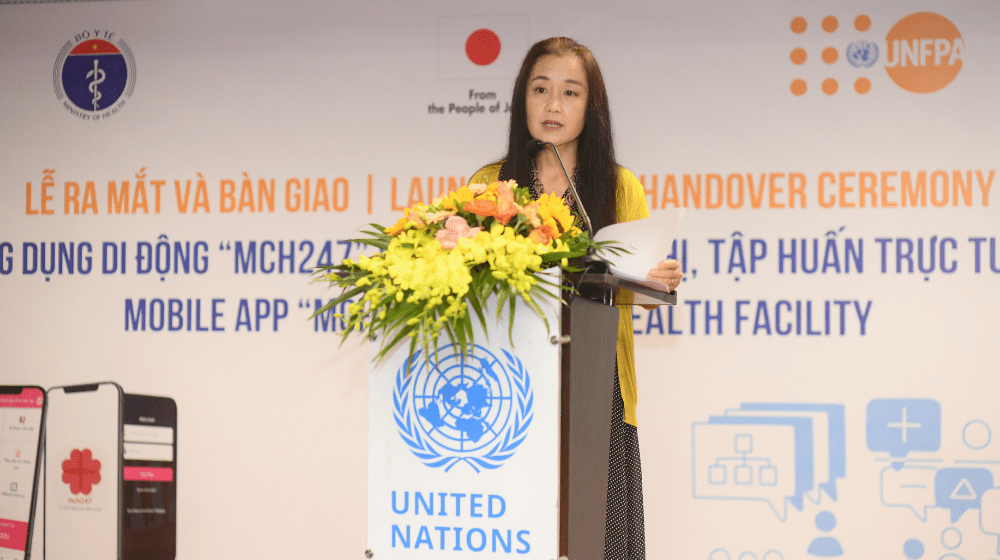Dr. Tran Dang Khoa, Deputy Director of the Maternal and Child Health Department, Ministry of Health;
Representatives of the Ministry of Health; the media, Civil Society Organizations, UNFPA colleagues and online participants;
Good morning,
I am very pleased to be here today for the launch of the Mobile App “MCH247”, which was developed with technical and financial support from UNFPA and the Government of Japan to ensure the continuous prevision of sexual and reproductive health information and services in the COVID-19 context in Viet Nam. I would like to express my sincere appreciation to the leadership of the Ministry of Health, particularly Dr. Hang, the late Dr. Vinh, Dr. Tuan and Dr. Khoa as well as CCIHP for developing this inspiring digital application to provide sexual and reproductive health information and services particularly during a prolonged and complicated pandemic situation.
Today, we are having this event to make sure that essential services are provided in a continuous way for pregnant mothers, newborns, and children, particularly among the most vulnerable groups such as migrant workers and ethnic minorities. We were alarmed when we conducted a modelling study in 2020 on the impacts of COVID-19 on maternal mortality, as it estimated the possibility of an increase in maternal mortality by 44-65% as a negative consequence of COVID-19. This could mean the reversal of developmental gains that Viet Nam has achieved over the last decades in reducing maternal mortality, threatening the achievement of SDG 3 targets. No woman should die giving birth, and this must hold true even with COVID-19.
With COVID-19, the health system is overwhelmed, and a lot of women tend to postpone or cancel antennal care visits and other pregnancy-related appointments due to fear of infection at health facilities. When the situation like this happens, risks of pregnancy and pregnancy complications cannot be identified on time, and necessary quality care cannot be provided well. This can lead to maternal deaths, and we must prevent this from happening.
One of the solutions to this is to make sure that quality sexual and reproductive health services are provided in a safe manner without any interruption, and pregnant mothers should feel confident and comfortable in seeking health care.
In order for this to happen, UNFPA is proud to work with the Ministry of Health and CCIHP to develop the Mobile App MCH 247. This is part of our ongoing tele-health initiative, but specifically geared towards sexual and reproductive health in ethnic minority populations. The App also provides information on gender-based violence for both providers and clients, to raise awareness and prevent violence against women. According to the 2019 National Study on Violence against Women, 2 in 3 Vietnamese women face one or more forms of violence in their life time.
Dear participants,
Today, I am very proud that, together with the Government of Japan, we are also handing over to the Maternal and Child Healh Department of the Ministry of Health a full set of tele and video-conferencing system, which is essential part of the tele-health initiative. Normally and without COVID-19, we support to have clinical consultations, conduct technical supervision and backstopping, and carry out training and capacity development for provincial medical practitioners. However, due to the need for social-distancing and travel restricitons, we thought it would be ideal if we provide this tele-consultation facility to the Ministry of Health, so as to ensure that appropriate guidance is provided by the Ministry to provinces in ensuring sexual and reproductive health care to pregnant women.
UNFPA works very closely with the Government of Viet Nam to meet the needs of women and girls - to achieve zero preventable maternal deaths, zero unmet need for family planning, and zero gender-based violence and harmful practices against women and girls by 2030, so as to ensure that no one is left behind in humanitarian response as well as in development effort. Sexual and reproductive health is a human right, and pregnancies and childbirth don’t stop in the pandemic situation. Together, let’s put the brakes on COVID-19 and its negative impacts in the country.
Thank you.


